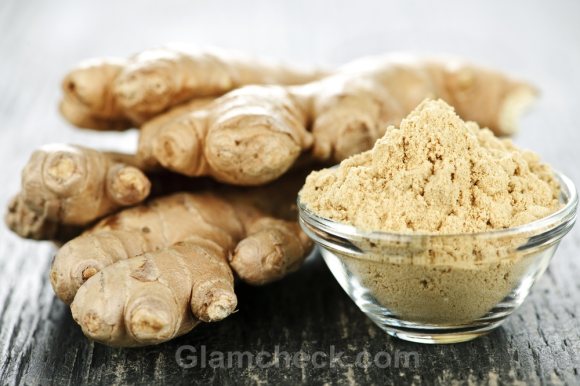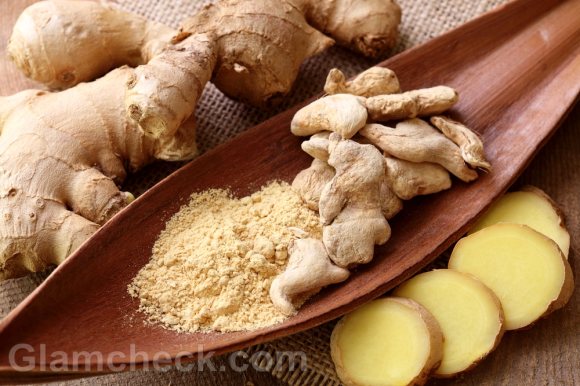Before the advent of modern medicine and the proliferation of pharmaceutical drugs, people relied on natural remedies to heal their various ailments. Sadly, the birth of the modern-day health care system spelled the death of most natural remedies and alternative therapies even though they worked quite well. Fortunately, some nuggets of wisdom still survive. The use of ginger for several health benefits is one of them.
The ancient Indian system of medicine, Ayurveda, as well as other alternative therapies such as naturopathy, herbal therapy, and aroma therapy all advocate the health benefits of ginger. Chinese medicine has employed ginger for its health benefits for over 2500 years.
What is Ginger?
 The plant that ginger is derived from is known as Zingiber officinale. The bulb of ginger that you and I know by sight is actually the rhizome of the Zingiber officinale. A rhizome is a horizontal stem that grows underground and which has nodes out of which roots and above-ground stem systems are formed. While other parts of the ginger plant are also used in cooking, medicine, and beauty treatments, it is the health benefits of the widely available rhizome that we will be discussing today.
The plant that ginger is derived from is known as Zingiber officinale. The bulb of ginger that you and I know by sight is actually the rhizome of the Zingiber officinale. A rhizome is a horizontal stem that grows underground and which has nodes out of which roots and above-ground stem systems are formed. While other parts of the ginger plant are also used in cooking, medicine, and beauty treatments, it is the health benefits of the widely available rhizome that we will be discussing today.
Ginger falls into the category of herbs and spices. Ginger was first cultivated in South Asia. But over time, its popularity has led to it to being grown in sub-tropical regions all over the world. So you will find ginger at your health food store and at your local department store all year round no matter which country you are in. If not, you will at least find ginger powder, ginger juice, ginger capsules or ginger pulp. However, keep in mind that ginger is best when fresh. The taste and efficacy of ginger change when used in other forms.
Health Benefits Of Ginger
 There is no denying the health benefits of ginger. People who use ginger to treat their ailments or to derive the other health benefits of ginger have reported good results. And Eastern medicine has long incorporated ginger into its multitude of healing systems. However, not enough studies are done about alternative therapies so don’t expect the next issue of some fancy scientific journal to wax eloquent about the health benefits of ginger. While your doctor or nutritionist may recommend some ginger in your diet, the people who really know about this multi-purpose herb are alternative therapists themselves. So if you are lucky enough to have a Chinese medicine woman or an Ayurvedic doctor in your vicinity, you will have a better chance of getting an unbiased opinion and a genuine account about the health benefits of ginger.
There is no denying the health benefits of ginger. People who use ginger to treat their ailments or to derive the other health benefits of ginger have reported good results. And Eastern medicine has long incorporated ginger into its multitude of healing systems. However, not enough studies are done about alternative therapies so don’t expect the next issue of some fancy scientific journal to wax eloquent about the health benefits of ginger. While your doctor or nutritionist may recommend some ginger in your diet, the people who really know about this multi-purpose herb are alternative therapists themselves. So if you are lucky enough to have a Chinese medicine woman or an Ayurvedic doctor in your vicinity, you will have a better chance of getting an unbiased opinion and a genuine account about the health benefits of ginger.
The health benefits of ginger encompass several general health problems as well as some serious ones like cancer. Following are some of the wonderful health benefits of ginger that you probably had no idea about.
Improves Digestion
Of all the health benefits of ginger, this is the most well-known and widely accepted. Ginger helps soothe the digestive system. Ginger has long been used as an analgesic – a remedy for an upset stomach. It can act as a colon cleanser and help to release intestinal gas. Ginger tea after your meals will help to stimulate digestive juices and ease digestion even after a very heavy meal. Constipation and diarrhea both can be cured with ginger as it will regulate your bowels.
For Nausea and Vomitting
Morning sickness plaguing you in your pregnancy first trimester? Keep some ginger handy to either chew on or smell and you won’t be so badly affected. The constituents in ginger that give it its spiciness – shogaols and gingerols – have the ability to balance the movements of the gastrointestinal tract to an unbelievable extent. The severity of the worst cases of nausea and vomiting can be reduced by taking ginger. Ginger helps with motion sickness too, and is also taken by people suffering from nausea caused by chemotherapy.
Aids Weight Loss
Although there is much research and validation to be done on the subject, one of the health benefits of ginger may be that it aids weight loss. There are many reasons for this theory. For one thing, ginger helps you feel more full, which will prevent you from over-consumption of other foods, thus contributing to weight loss. Plus, a study conducted in Netherlands showed that ginger not only boosts a sluggish metabolism but also burns fat.
But do not expect miracles. Ginger can help with weight loss if you take care of your diet and perhaps incorporate some exercise into your physical routine. You can’t gobble cakes and pizza and expect the ginger to help.
May Prevent and Treat Cancer
This is one of the most highly-debated health benefits of ginger. Ginger has some of the highest antioxidant levels of all food groups. Some studies have shown that ginger can kill cancer cells by making them commit suicide. Although this is a marvelous breakthrough, it only works in a lab and creating real-world treatment for cancer with ginger is still far off. However, you can boost your antioxidant levels by eating more ginger. Researchers feel that this may help to prevent cancer in those at high risk for the disease. The cancers that especially benefit from ginger are rectal cancer, prostate cancer, ovarian cancer, lung cancer, breast cancer, blood cancer and pancreatic cancer.
Good for The Blood
One of the most useful health benefits of ginger is how great it is for your blood. Ginger cleans the blood and stimulates circulation throughout the body. And since the blood is what heals you, this can lead to better overall health. Ginger is also known to be an effective natural blood thinner. This can benefit high blood pressure patients as thinner blood can lower your blood pressure. Another great feat of this wonderful herb is that it makes the platelets in your blood less sticky, which promotes the health of your cardiovascular system. Ginger also prevents blood clots.
Cures Coughs and Colds
The obvious health benefits of ginger would include it being a decongestant. The spicy, pungent herb has long been a regular remedy for coughs and colds in alternative therapies such as naturopathy and Ayurveda. Ginger has a warming effect on the upper respiratory tract, and it stimulates the secretion of mucous, thus bringing you relief from a stuffy nose. Another health benefit of ginger is that it can cure you of a respiratory infection.
Cures Migraines
One of the best health benefits of ginger is that it can be useful and very efficient at preventing migraines or alleviating the symptoms. There is a substance called prostaglandin which causes the blood vessels in the brain to get inflamed, thus leading to migraines. Ginger can block prostaglandins better than any medication can. So if you have been having incessant migraines, give ginger a try.
Has Anti-inflammatory Properties
Many people report the health benefits of ginger when it comes to arthritis. Ginger has anti-inflammatory properties which may ease the pain experienced by arthritic patients on a daily basis. Since the only other remedies for arthritic pain are high doses of medication or surgery, ginger is a blessing. Including ginger regularly in your diet my also prevent the inflammatory compounds that cause arthritic pain from forming in the first place. You can also use ginger oil to massage the affected area and ease muscle pain.
Apart from reducing the pain for arthritics, the anti-inflammatory properties of ginger are also good for your heart and general health.
Other Medicinal and Health Benefits of Ginger
- Some women experience relief from period cramps when they take ginger.
- Ginger contains natural compound called cineole which is known to be a stress buster and a mood enhancer.
- Suffer from bad breath? Chew on a piece of raw ginger. The anti-bacterial properties of ginger will destroy the bacteria that cause bad breath.
- If you have minor burns or an itchy rash, apply some fresh ginger juice for immediate relief.
- Ginger is thought to lower the cholesterol in the blood. This makes it a must-include food for diabetics and blood pressure patients.
- A known anti-allergen, ginger can also act as an antihistamine and help guard against or treat allergies.
- The mucous-secreting properties of ginger help in the prevention of stomach ulcers.
- Ginger contains a compound called zingibain which can kill parasites.
- Some women report that taking ginger helps to reduce the severity of their menopause hot flashes.
- Ginger maintains the health of your kidneys.
- Have a headache? Drink a cup of hot ginger tea for relief.
- This miracle herb will boost your immune system better than a whole bunch of supplements.
How to Incorporate Ginger Into Your Diet
 Hopefully, you are convinced enough of the efficacy of this potent herb that you want to include ginger in your diet. There are a number of ways in which you can gain the health benefits of ginger through your food. The good news is that you do not need to eat a very large quantity to gain the health benefits of ginger. Its healing properties are so potent that you need only 3 to 3.5 oz a day to reap its health benefits. Following are some of the simplest ways in which to ease ginger into your life.
Hopefully, you are convinced enough of the efficacy of this potent herb that you want to include ginger in your diet. There are a number of ways in which you can gain the health benefits of ginger through your food. The good news is that you do not need to eat a very large quantity to gain the health benefits of ginger. Its healing properties are so potent that you need only 3 to 3.5 oz a day to reap its health benefits. Following are some of the simplest ways in which to ease ginger into your life.
- Chew on it raw, Yes, that’s right. Just cut off a thin, small sliver of ginger and chew on it till the juices run dry or for about 30 minutes. You may not like the taste of raw ginger initially, but it is not that unpleasant and something you can easily get used to if you are serious about getting the health benefits of ginger.
- Grind your ginger into a pulp to refrigerate. It is now ready to be used in your cooking and as a poultice. Ginger-garlic paste forms an integral ingredient in Indian recipes. And many worldwide cuisines are also opening up to the idea of a little ginger in their recipes. The pulp once prepared makes it very convenient to use while cooking and even while making tea. Speaking of which…
- Ginger tea is one of the most popular ways to get the health benefits of ginger. Ginger tea is a warming and fulfilling beverage for the winter. You can start out by putting just a little bit of ginger into your vessel while you are brewing your tea. But chances are that you will love the taste and will be more liberal with the portions you add in a very short while. If you are too busy to make a pulp, no problem. Fortunately for the modern generation, many things that our parents had to work for are conveniently available to us. Ginger powder is now a common item in the spice section at the supermarket. It is easy to use and store, is inexpensive, and a great alternative to the rigors of peeling and grinding your ginger to a pulp.
- Many South- Asian dishes use ginger for its uniquely pungent flavour. From Indian curries to Chinese meat preparations and Malaysian broth. You don’t have to travel to Asia to get your dose of ginger from these marvelous dishes. Just look up the recipes online and give it a go in your own kitchen.
- Add very thin slices of ginger to your salads to add a spicy level of flavor. Remember that ginger is an acquired taste and may not be agreeable to everyone’s palate. So start with tiny almost indiscernible pieces of it, especially if other members of the family are going to be sharing the salad.
- Ginger juice can be taken in small quantities or added to regular vegetable and fruit juices.
- Make ginger pickle. You can eat this with bread or rice or even on its own if you like the taste.
- Ginger essential oils and ginger massage oils are easily available at your health food store. Use as per directions on the bottle.
- Ginger capsules and tablets can also help you reap the health benefits of ginger.
Image: Shutterstock
